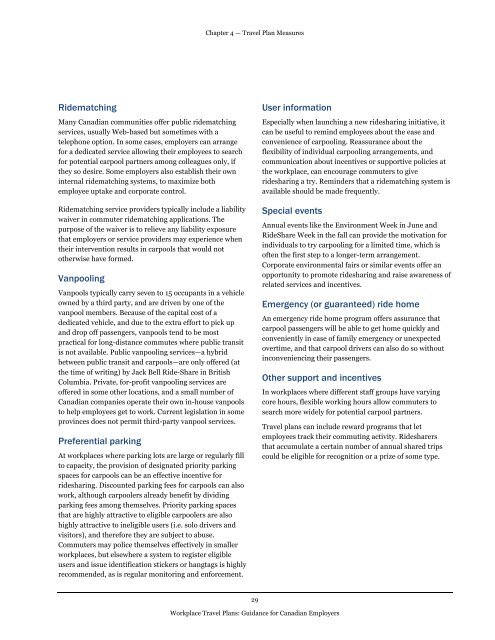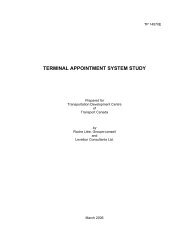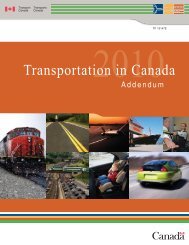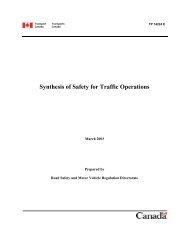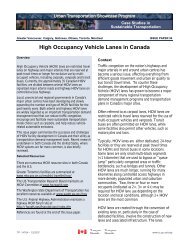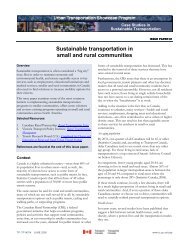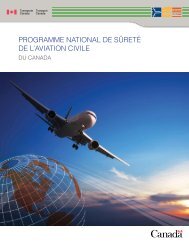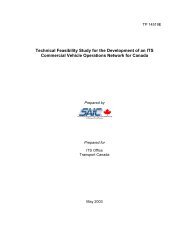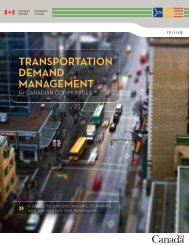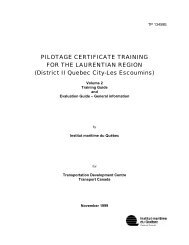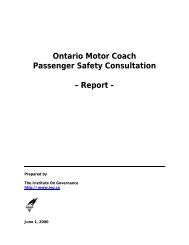Workplace Travel Plans - main body - Final Jan 2010 ENGLISH - FCM
Workplace Travel Plans - main body - Final Jan 2010 ENGLISH - FCM
Workplace Travel Plans - main body - Final Jan 2010 ENGLISH - FCM
Create successful ePaper yourself
Turn your PDF publications into a flip-book with our unique Google optimized e-Paper software.
Chapter 4 — <strong>Travel</strong> Plan Measures<br />
Ridematching<br />
Many Canadian communities offer public ridematching<br />
services, usually Web-based but sometimes with a<br />
telephone option. In some cases, employers can arrange<br />
for a dedicated service allowing their employees to search<br />
for potential carpool partners among colleagues only, if<br />
they so desire. Some employers also establish their own<br />
internal ridematching systems, to maximize both<br />
employee uptake and corporate control.<br />
Ridematching service providers typically include a liability<br />
waiver in commuter ridematching applications. The<br />
purpose of the waiver is to relieve any liability exposure<br />
that employers or service providers may experience when<br />
their intervention results in carpools that would not<br />
otherwise have formed.<br />
Vanpooling<br />
Vanpools typically carry seven to 15 occupants in a vehicle<br />
owned by a third party, and are driven by one of the<br />
vanpool members. Because of the capital cost of a<br />
dedicated vehicle, and due to the extra effort to pick up<br />
and drop off passengers, vanpools tend to be most<br />
practical for long-distance commutes where public transit<br />
is not available. Public vanpooling services—a hybrid<br />
between public transit and carpools—are only offered (at<br />
the time of writing) by Jack Bell Ride-Share in British<br />
Columbia. Private, for-profit vanpooling services are<br />
offered in some other locations, and a small number of<br />
Canadian companies operate their own in-house vanpools<br />
to help employees get to work. Current legislation in some<br />
provinces does not permit third-party vanpool services.<br />
Preferential parking<br />
At workplaces where parking lots are large or regularly fill<br />
to capacity, the provision of designated priority parking<br />
spaces for carpools can be an effective incentive for<br />
ridesharing. Discounted parking fees for carpools can also<br />
work, although carpoolers already benefit by dividing<br />
parking fees among themselves. Priority parking spaces<br />
that are highly attractive to eligible carpoolers are also<br />
highly attractive to ineligible users (i.e. solo drivers and<br />
visitors), and therefore they are subject to abuse.<br />
Commuters may police themselves effectively in smaller<br />
workplaces, but elsewhere a system to register eligible<br />
users and issue identification stickers or hangtags is highly<br />
recommended, as is regular monitoring and enforcement.<br />
User information<br />
Especially when launching a new ridesharing initiative, it<br />
can be useful to remind employees about the ease and<br />
convenience of carpooling. Reassurance about the<br />
flexibility of individual carpooling arrangements, and<br />
communication about incentives or supportive policies at<br />
the workplace, can encourage commuters to give<br />
ridesharing a try. Reminders that a ridematching system is<br />
available should be made frequently.<br />
Special events<br />
Annual events like the Environment Week in June and<br />
RideShare Week in the fall can provide the motivation for<br />
individuals to try carpooling for a limited time, which is<br />
often the first step to a longer-term arrangement.<br />
Corporate environmental fairs or similar events offer an<br />
opportunity to promote ridesharing and raise awareness of<br />
related services and incentives.<br />
Emergency (or guaranteed) ride home<br />
An emergency ride home program offers assurance that<br />
carpool passengers will be able to get home quickly and<br />
conveniently in case of family emergency or unexpected<br />
overtime, and that carpool drivers can also do so without<br />
inconveniencing their passengers.<br />
Other support and incentives<br />
In workplaces where different staff groups have varying<br />
core hours, flexible working hours allow commuters to<br />
search more widely for potential carpool partners.<br />
<strong>Travel</strong> plans can include reward programs that let<br />
employees track their commuting activity. Ridesharers<br />
that accumulate a certain number of annual shared trips<br />
could be eligible for recognition or a prize of some type.<br />
29<br />
<strong>Workplace</strong> <strong>Travel</strong> <strong>Plans</strong>: Guidance for Canadian Employers


